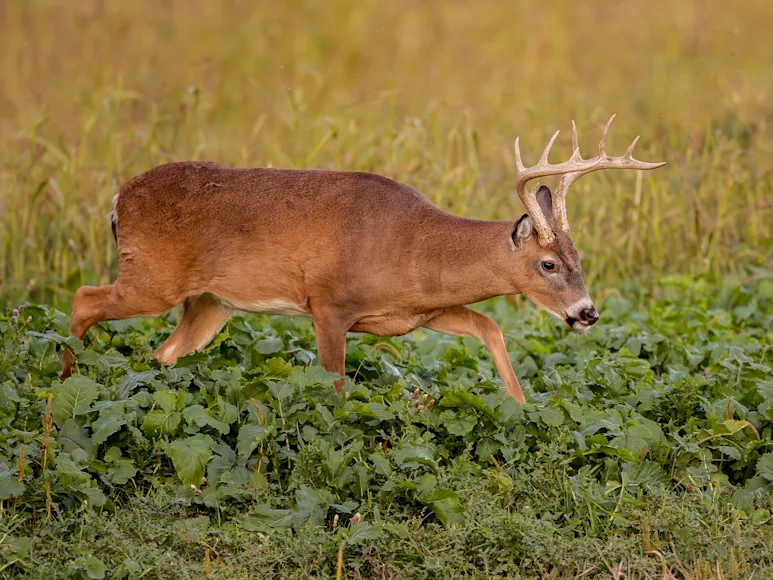I WAS AT the base of the tree, adjusting my climbing stand’s platform to the perfect upward angle so that it’d level out 20 feet off the ground. The stand’s scraping against white-oak bark sounded remarkably like bucks sparring. That was just what I was thinking to myself when I looked up and saw a flash of movement 70 yards up the ridge.
I dropped to my knees and glassed, straining to confirm what I thought I was seeing: a deer, slinking silently through wet leaves. I focused on a back leg, the hock stained black. A thick neck and an antler frame twisted toward me, and then a buck lurched into full view.
I had two choices: I could try to guess the buck’s age and do a quick, rough calculation of the rack’s score, or I could drop the binos, pick up my bow, and try to kill him. I couldn’t do both, because the buck, slightly above me on the ridge, was loping into chip-shot range.
Can’t Resist
I’m susceptible to tunnel vision in moments like this. Once, on a muzzleloader hunt in Kansas, I was waiting on a monster buck that I’d seen cross a power line clearing out of range the afternoon before. I’d made myself a makeshift ground blind out of johnsongrass and ticks, and I was spending the final five minutes of shooting light with bated breath, my rifle on Trigger Sticks and my thumb on the hammer.
When a buck suddenly appeared 30 yards to my right, there was no doubt that he was not the deer I’d been hunting. And yet I shouldered the gun as if I were reacting to a springing teal. I saw the crosshairs hit his shoulder, and I plowed him over in a brilliant plume of fire and smoke. Looking at the 90 inches of antler that the buck had grown in his short two and a half years was like getting news of an unplanned pregnancy. It’s hard not to smile looking back on all the fun leading up to the fact, but you know that this isn’t a habit to fall into either.
Already Committed
I was in the woods with my climber on a spur-of-the-moment hunt—the kind that, for whatever reason, seems to work pretty damn often. It was October 25, and I had no pictures of a big pre-rut buck moving in the area with any sort of regularity. And it was still too early to catch a cruising buck from one of my best rut stands. But it was bow season, drizzling rain, and 20 degrees cooler than it’d been all fall, and you’ve got to have sense enough to hunt on a day like that.
So I knocked off work after lunch and hiked into a block of timber where I’d spent several mornings of the previous turkey season. Back in April, it seemed every third sapling on that ridge was scarred by an old buck rub, and as I yelped for gobblers, deer darted about like cats off a crazy woman’s porch. It was good, deep cover, landlocked by posted property on all sides except one and accessible only by foot—just the place to try to stumble into something on a cold-front day with no specific plan.
I flushed a veritable covey of deer while trying to sneak in. There was snorting and stomping in every direction. But I was there, and the place was whipped over with fresh sign. I figured I might as well climb a tree and sit till dark in the cold rain. I made it as far as adjusting the climber before it hit the fan.
Now I was kneeling and hugging the tree trunk, 25 yards away from a buck that I could tell was pretty good, but not big—a deer that I’d pass on given any bit of normal levelheadedness. And yet my release aid held to my D-loop as if it were cemented there, and my knees had somehow arranged themselves into a perfect shooting position.
I couldn’t draw without getting busted. Then the buck, nervous because he couldn’t see the intruder he’d heard, spun to leave, waving his tail in a not-scared-but-still-leaving kind of way. I could’ve let him go right there and enjoyed the memory of a fascinating encounter. But I’d already committed—the second I saw that black hock, if you want to know the truth of it. So I grunted at him, completely ignoring the inner voice saying, You know better than this.
Story Buck
He came trotting back, and this time I was drawn and anchored when he stepped broadside at 45 yards. He was dead by the time I stood up; I could see his white belly, almost glowing, up ahead in the damp, open hardwoods.
And so I found myself in familiar straits, looking over a 3½-year-old 8-pointer that had two missing brow tines and a G2 snapped off at the base. If you had told me that the buck had 90 inches of antler remaining, I’d have said, That’s very kind of you. My one and only Kentucky buck tag of the season was now filled, about a week before things would really get good.
Sometimes my buddies give me hell for getting hot-blooded and killing deer that I “shouldn’t.” They’re right, I suppose, but if I feel bad about anything, it’s usually just that my tag is burned and I’m done buck hunting. And to be honest, I take a little pride in this character flaw too. That 8-pointer gave me one of the coolest hunts I can remember and a good story to tell. Old habits can be hard to break—especially when you don’t really want to break them.
__This story originally ran in the Danger Issue
of_ Field & Stream_. Read more F
stories.__





